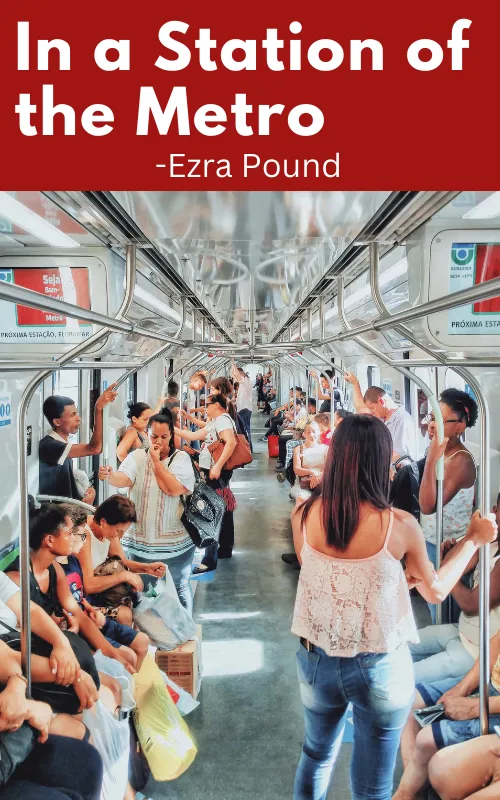About the Poem- In a Station of the Metro
| Poem Title | In a Station of the Metro |
| Author | Ezra Pound |
| Year of Publication | First published in 1913 |
| Genre | Imagist poetry |
| Poetic Form | Free verse (no specific rhyme or meter) |
| Literary Movement | Imagism |
| Structure | A two-line poem (a couplet) |
| Narrator | First person |
| Setting | A metro station |
| Subject | The beauty and fleeting nature of human life |
Themes of In a Station of the Metro
The themes of “In a Station of the Metro” by Ezra Pound are:
- Urban Isolation ➤ The poem portrays the loneliness and disconnection experienced in a busy, modern city.
- Snapshot of a Moment ➤ It captures a brief moment in time, highlighting the fleeting and transitory nature of life.
- Imagery and Impressionism ➤ The poem emphasizes the power of vivid, concise imagery to convey emotions and thoughts.
- Beauty and transience ➤ The poem celebrates the beauty of human life, but also reminds us that it is fleeting. The speaker compares the faces of the people in the metro station to “petals on a wet, black bough.”
“In a Station of the Metro” Poem by Ezra Pound
The apparition of these faces in the crowd:
Petals on a wet, black bough.
Watch Full Poem Summary & Analysis on YouTube
In a Station of the Metro Summary & Analysis
Ezra Pound’s poem “In a Station of the Metro” is a short but powerful Imagist poem that captures the fleeting beauty of human life. The poem is set in a metro station, and the speaker compares the faces of the people passing by to “petals on a wet, black bough.”
This image is both striking and beautiful. It conveys the speaker’s sense of awe and wonder at the diversity and beauty of human life. The petals of a flower are delicate and ephemeral, just like human life. They are also a symbol of beauty and new beginnings.
The poem’s second line is even shorter, but it is still packed with meaning. The speaker’s comparison of the faces to “petals on a wet, black bough” suggests that human life is both precious and fragile. Just like petals, human life can be easily damaged or destroyed.
The poem’s brevity and simplicity add to its power. Pound is able to convey a great deal of meaning in just a few words. The poem is also notable for its lack of punctuation. This contributes to its sense of immediacy and impact.
The poem can be interpreted on many different levels. On one level, it is simply a celebration of the beauty of human life. But on a deeper level, the poem can also be seen as a meditation on the transience of life and the importance of cherishing each moment.
The poem is also a reminder of our shared humanity. The speaker is able to see the beauty in the faces of the people in the metro station, even though he does not know them. This suggests that there is a deep connection between humans, even if we are often strangers to each other.
FAQs from In a Station of the Metro
What is the meaning of In a Station of the Metro?
The meaning of “In a Station of the Metro” by Ezra Pound is that human life is beautiful and fleeting, and that we should cherish each moment.
What does petals on a wet black bough mean?
The phrase “petals on a wet black bough” from the poem can be interpreted as a symbol of the beauty and fragility of human life.
What is the juxtaposition in the station of the metro?
The juxtaposition in “In a Station of the Metro” is between the beauty and fragility of human life.
What is the tone of the poem In a Station of the Metro?
The tone of the poem “In a Station of the Metro” by Ezra Pound is awe and wonder.











